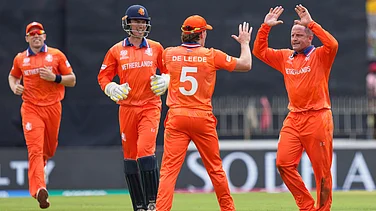IN a rather cramped but well-appointed ward of the intensive cardiac care unit of a small charitable hospital in east Calcutta, you come across the disturbingly inscrutable visage of an enormous tragedy. It socks you hard. Its the face of 66-year-old Mihir Sen, the all-Indian hero, who over three decades ago swam into the record books by conquering the English Channel and Palk Straits. Unfortunately, its a void which you strive to grasp, but in vain. For its a sieve that holds nothing. Mihir Sen has no story to tell of his glory days. Of his double conquest. But do we really care?
You tiptoe into the roomshoes have to be taken off and left at the entrance of the hospital because, as its owner says, Anandalok is more like a temple than a medical care centreto ensure that the inmate isnt disturbed. Mihir Sen is wide awake. You struggle to greet him with a faint smile. Freeze! He stares blankly, muttering incoherently, trying desperately to rearrange the bewildering jigsaw puzzle that his life has been reduced to. Wasnt that a nod of recognition? Theres no way of knowing.
A victim of Alzheimers disease for the past 17 years, abandoned by relatives, friends and well-wishers, Mihir Sen says very little, recognises virtually nobody and remembers absolutely nothing. If that isnt bad enough for the once-sturdy, tenacious and proud athlete, who dared to dream big but has now been deserted by his own glorious memories, the nation, too, seems to have forgotten his feats of endurance as a swimmer. Forgotten that on September 23, 1958, he became the first Asian to cross the English Channel from Dover beach in the United Kingdom to Calais in France. Forgotten that, before anybody else in the world imagined it was possible, he swam across the choppy waters of the Palk Straits in April 1966. Forgotten that the then Indian Prime Minister, Jawaharlal Nehru, conferred the Padma Shri on him in 1961. Forgotten that for years together, he was a hero who had assumed the proportions of a folk icon.
Folk icon, who? Our collective amnesia is not at all surprising. In an age when channel-surfing is the only sport that millions of couch potatoes are interested in, men who brave miles of choppy water, and in far-off parts of the world at that, are no more than oddballs, freaks, objects of only cursory interest.
Thankfully, there is at least one good samaritan in Mihir Sens native city who is determined not to let the seriously ailing swimmer die a lonely, undignified, messy death. D.K. Saraf, honorary secretary of the Anandalok Charitable Hospital in Salt Lake. Says he: "Sens was a name we all heard in our youth. He was a man we all admired. I am only repaying a debt to a great sportsman who made us proud to be Indians."
So when, on November 3, Saraf chanced upon a report in an old newspaper that narrated the sad state Mihir Sen was inin addition to Alzheimers, he had contracted Parkinsons, which had reduced him to a quaking wreckhe rushed to the former swimmers residence in Alipore and moved him to the hospital. "When I entered his room, he was completely unattended, lying in his own urine and excreta," recalls Saraf. "His body was stiff, like a dead mans."
It was now or never. Staff at the Anandalok hospital, built on a plot of land donated by a philanthropist and whose trustees include Calcuttas cricket czar Jagmohan Dalmiya, immediately swung into action. A special air-conditioned room, complete with a television set and a music system ("music has therapeutic qualities," Saraf reminds you), was quickly arranged for Sen. Saraf s sister was given charge of his treatment and two doctorsJyoti Dev and Ashish Kumarwere put on round-the-clock duty. It has been nearly a month since then and Sen is responding to treatment. Besides walking up and down the hospitals corridor, often aided by a ward-boy or two, Sen occasionally climbs the stairs to the terrace and spends time there.
"Physically, he is a lot better now," says Dr Ashish Kumar. "He can communicate his basic needslike when wants to go for a stroll or to the toiletto us and move around with the minimum of assistance." Saraf is delighted with the progress of his single-minded mission: "When I brought him here, all I wanted to do was to ensure that a man who brought so much glory India should die in dignity. I only wanted to make his passing away less painful." The pain seems to have been taken care ofthe bed sores are gone and the crippling physical disabilities have been checked to a great extentbut Mihir Sens death, is now farthest from Sarafs mind. "I want him to live. I can only describe it as a miracle, Gods handiwork. A half-dead man is back on his feet."
Saraf, of course, is not leaving it at that. He is now praying for much more than a miracle: help from either Doordarshan or Films Divisiontwo government organisations not known to react with alacrity to emergencies, especially those that do not involve politiciansin locating recordings of Mihir Sens English Channel and Palk Straits conquests or of the investiture ceremony where he received his Padma Shri. "It could bring his memory back," says Saraf, with beguiling optimism. "Now that the physical recovery has been achieved, I would like to nurse him back to full mental health."
BUT is that possible? Though Dr Ashish Kumar agrees that it is only in very rare cases that the patients memory can be restored, he feels its worth a try, no matter how futile. Only then will the mission that Saraf has undertaken be fully successful.
What makes Anandaloks efforts especially commendable is that they are completely unsupported by government agencies. Except for the Rs 1,000 dole that Mihir Sen has been receiving for many years now from the Union Government, he has been left to fend for himself. Anandalok is spending Rs 3,000 every day on the treatment. "Is it too much to expect some help from the Union and state governments?" asks Saraf.
Mihir Sens estranged wife, Bella, a half-British, half-Hungarian typist whom the swimmer met in London while studying law, is in Calcutta. But shes visited the Anandalok hospital no more than twice, since Sen was admitted. The swimmers neighbours in the posh Alipore area, too, have no time for a man who is of little use to them. Says a shopkeeper in the market where local residents buy their daily provisions: "We rarely saw him in all these years, let alone being aware of the seriousness of his ailment." Callousness, according to an indignant Saraf, is our greatest ailment. "Its perhaps far worse than the serious diseases that have afflicted Mihir Sen," he says. But sadly, there is no cure for it.


























